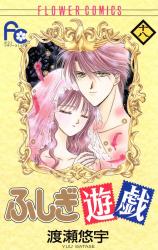Lots of hate comments here, and I have to say that Fushigi Yuugi deserves them to some extent. I also see a lot of people comparing the manga series to the anime series, which I personally haven't watched, but I heard that the anime series kept most the plot points intact, so I'll assume the same applies to both adaptations.
Fushigi Yuugi is...a classic. It's not the first of the time traveling school girls, but it's definitely old enough, and sets up enough archetypes to earn the name of a classic. Hell, Miaka and Yui were sucked into the world of a mystic Ancient China a good 4 years before the famous Kagome first made her trip down the well. With this point made, I think it's fair to point out that Miaka fits the image of most shojo characters at the time: an innocent, naiive, cute, ditzy, but ultimately courageous girl that finds the strength in herself to save the world. While that might be overused and seem horrible today, back in 1992, maybe it wasn't so bad, especially considering the target audience.
Of course, our values in good shojo manga have long since changed, and 10 years later, Yuu Watase-sensei shows that she has been improving her storytelling and keeping up with the demands of a new female audience that wants to see more action from the heroine herself rather than the protection of handsome men. I think that this new set of expectations towards shojo manga is what blinds people to some of the better aspects of Fushigi Yuugi, and prevents people from enjoying it as much.
Most people complain about Miaka's character, but I think her character makes her human. She does develop bit by bit throughout the series as well. I'm not a particular fan of her character, and god knows how many times she's frustrated me, but I think people tend to focus too much on the negative traits and fail to see the development of her character. Beyond just the character of Miaka though, I think that people fail to give the vast and colorful supporting cast enough credit. Fushigi Yuugi has a myriad of different characters, from the seven soldiers of Suzaku to the seven soldiers of Seiryuu. Chihiri, Tatsuki, Nuriko, Mitsukake, Suboshi, Amiboshi...most people can find at least someone to relate to.
As for the length, while 18 volumes seems hefty, I think it's necessary in order to cover through all the plot points that Watase-sensei did. 13 volumes to develop and describe the huge cast of characters as well as move forward the plot that took place in ancient China wasn't really too long. If it had been any shorter, things might have been overly rushed. I think there were some scenes that could have been cut, but I don't think they were negatively impacting the story since the plot is very character driven and each scene helped develop at least some of the characters. I wasn't nearly as fond of the latter half of the series, but it helped in showing Miaka as she matured and gave an almost 'coming of age' type of air to the series, so it kept me until the end.
As for the art, I personally like Watase-sensei's art, and she improved through the course of the 18 volumes. As for Miaka 'ugliness' as commented by a few other people...I don't think it's important to the plot at all, and besides that, it's purely subjective based on one's opinion of the art in general, so I won't bother commenting.
This is a pretty biased review since I have a lot of fond memories tied to Fushigi Yuugi. If I had read this series today and not back when I was first introduced to manga, my opinion would probably be very different, and I might have hated the series. But nostalgia does a lot, and I really do appreciate the classic storytelling of Fushigi Yuugi.





